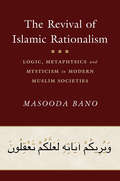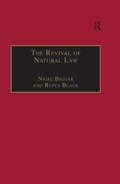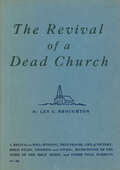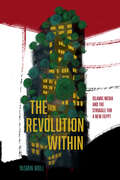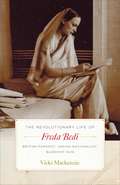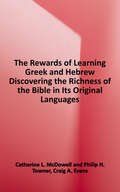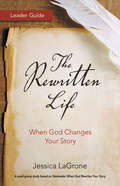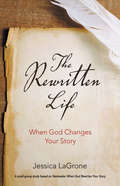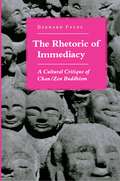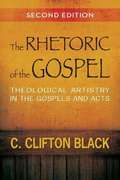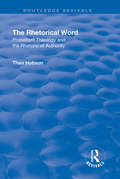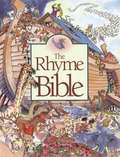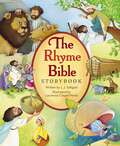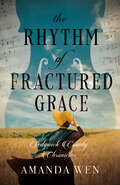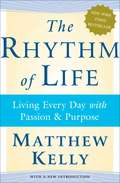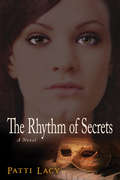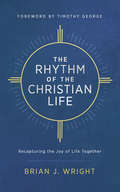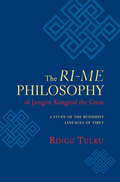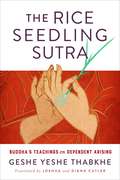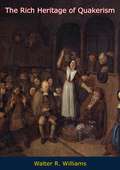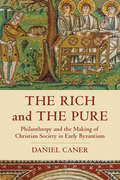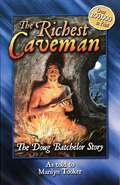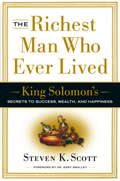- Table View
- List View
The Revival of Islamic Rationalism: Logic, Metaphysics and Mysticism in Modern Muslim Societies
by Masooda BanoIn this book, Masooda Bano presents an in-depth analysis of a new movement that is transforming the way that young Muslims engage with their religion. Led by a network of Islamic scholars in the West, this movement seeks to revive the tradition of Islamic rationalism. Bano explains how, during the period of colonial rule, the exit of Muslim elites from madrasas, the Islamic scholarly establishments, resulted in a stagnation of Islamic scholarship. This trend is now being reversed. Exploring the threefold focus on logic, metaphysics, and deep mysticism, Bano shows how Islamic rationalism is consistent with Sunni orthodoxy and why it is so popular among young, elite, educated Muslims, who are now engaging with classical Islamic texts. One of the most tangible results of this revival is that Islamic rationalism - rather than jihadism - is emerging as one of the most influential movements in the contemporary Muslim world.
The Revival of Natural Law: Philosophical, Theological and Ethical Responses to the Finnis-Grisez School
by Nigel Biggar Rufus BlackNatural law theory has been enjoying a significant revival in recent times. Led by Germain Grisez in the USA and John Finnis in the UK, one school of thinkers has been articulating a highly developed system of natural law built upon a sophisticated account of practical reasoning and a rich and flexible understanding of the human good. However, long-standing prejudices against old-style natural law among moral philosophers and Protestant ethicists, together with the new theory's appropriation by conservatives in the impassioned debate between the Vatican and dissenting theologians in the United States, have prevented the Finnis-Grisez version from being adequately appreciated. Providing a clear and substantive introduction to the theory for those who are new to it, this book then broadens, assesses, and advances the debate about it, examining crucial philosophical, theological and ethical issues and opening up discussion beyond the confines of the Roman Catholic Church. Part 1, on philosophical issues, starts with two broad chapters that locate the Grisez school in relation to modern moral philosophy and the Roman Catholic philosophical tradition of Thomism, and then follows these with further chapters on two crucial issues: the possibility of consensus on the human good, and the nature of moral absolutes. Part 2, on theological dimensions, begins with a Lutheran critique of Grisez, locates him in relation to the ethics of two very prominent 20th century Protestants, Karl Barth and Stanley Hauerwas, and then explores the major area of theological controversy within the Roman Catholic community - how to conceive of the "Church's" authority with regard to moral matters. Part 3 subjects the school's thought to critical examination in a broad range of ethical fields: bioethics, gender, sex and the environment. A concluding chapter then develops eight topics that recur in the course of the book: the status of ethical realism in the contemporary intellectual climate; whether realism is best conceived in rationalist or naturalist terms; whether marriage should be counted as a basic good; whether physical pleasure should not be counted a basic good; whether it is always wrong to act deliberately against a basic good; the problems of moral certainty and authority; the rapproachement between Protestant and Roman Catholic ethics; and, finally, whether ethical understanding is really independent of one's anthropological point of view. Drawing together North American, European and Australian contributors from across moral philosophy and Protestant ethics as well as from Roman Catholic moral theology, this book opens up the debate about the Finnis-Grisez theory, highlighting its strengths and weaknesses in order to advance current discussion about natural law in moral theology and in moral and legal philosophy.
The Revival of a Dead Church: A Revival in Soul-Winning, True Prayer, Life of Victory, Bible Study, Missions and Giving, Recognition of the Work of the Holy Spirit, and Other Vital Subjects (Colportage Library #85)
by Len G. BroughtonIs the church ready to be swept up to heaven? Unfortunately, what she is accomplishing and what she could be accomplishing for God does not match. God is certainly ready. The church is not.First published in 1900, this classic book assists the spiritual health of the church—both as a whole and to individuals—by addressing issues such as soul-winning, prayer, Bible study, giving, the Holy Spirit, and the like. Revive your own heart and life, and pray for revival of the church so she is ready when Christ comes again!
The Revival of a Dead Church: A Revival in Soul-Winning, True Prayer, Life of Victory, Bible Study, Missions and Giving, Recognition of the Work of the Holy Spirit, and Other Vital Subjects (Colportage Library #85)
by Len G. BroughtonIs the church ready to be swept up to heaven? Unfortunately, what she is accomplishing and what she could be accomplishing for God does not match. God is certainly ready. The church is not.First published in 1900, this classic book assists the spiritual health of the church—both as a whole and to individuals—by addressing issues such as soul-winning, prayer, Bible study, giving, the Holy Spirit, and the like. Revive your own heart and life, and pray for revival of the church so she is ready when Christ comes again!
The Revolution Within: Islamic Media and the Struggle for a New Egypt (Stanford Studies in Middle Eastern and Islamic Societies and Cultures)
by Yasmin MollThe New Preachers of Egypt—so named because of their novel preaching styles, which incorporate everything from melodrama to music to self-help—came to prominence on the world's first Islamic television channel on the cusp of the Arab Spring uprisings. They promoted an innovative and inclusive Islamic piety that millions of young middle-class viewers found radical and compelling—but were scorned as neoliberal by leftists, as stealth Islamists by secularists, and as too Westernized by other Muslim preachers. Drawing on long-term fieldwork with the New Preachers, their producers, and followers in Cairo, Yasmin Moll shows how Islamic media and the social life of theology mattered to contestations over the shape of a New Egypt. These mass-mediated fractures within Islamic Revivalism were happening at a time of both revolutionary possibility and authoritarian entrenchment. The New Preachers' Islamic media inspired a "revolution within" that transcended the country's divisions and anticipated the ethos of creativity, solidarity, and coexistence that soon would mark Tahrir Square, the ethical epicenter of the 2011 uprising. Vividly written and boldly theorized, The Revolution Within challenges conventional accounts of the 2011 revolution and its aftermath as a struggle between secular and religious forces, reconsidering what makes a practice virtuous, a public Islamic, a way of life Godly.
The Revolutionary Life of Freda Bedi: British Feminist, Indian Nationalist, Buddhist Nun
by Vicki MackenzieA fascinating biography of Freda Bedi, an English woman who broke all the rules of gender, race, and religious background to become both a revolutionary in the fight for Indian independence and then a Buddhist icon.She was the first Western woman to become a Tibetan Buddhist nun—but that pioneering ordination was really just one in a life full of revolutionary acts. Freda Bedi (1911–1977) broke the rules of gender, race, and religion—in many cases before it was thought that the rules were ready to be challenged. She was at various times a force in the struggle for Indian independence, spiritual seeker, scholar, professor, journalist, author, social worker, wife, and mother of four children. She counted among her friends, colleagues, and teachers Mohandas Gandhi, Jawaharlal Nehru, Indira Gandhi, the Dalai Lama, Chögyam Trungpa Rinpoche, and many others. She was a woman of spiritual focus and compassion who was also not without contradictions. Vicki Mackenzie gives a nuanced view of Bedi and of the forces that shaped and motivated this complex and compelling figure.
The Rewards of Learning Greek and Hebrew: Discovering the Richness of the Bible in Its Original Languages
by Philip H. Towner Catherine L. McDowellWhy study biblical languages? The Rewards of Learning Greek and Hebrew: Discovering the Richness of the Bible in Its Original Languages is written to convince you that it’s worth it! Professors Catherine L. McDowell and Philip H. Towner have spent years opening the eyes of students to the riches that await those who study Hebrew and Greek, and they invite you to listen in. This book is designed for people who have never studied the biblical languages―everything is in English or English script, and everything is clearly explained. The Rewards of Learning Greek and Hebrew contains a number of case studies―some from the Hebrew Bible and some from the New Testament―that demonstrate the kind of accuracy and insight that await those who study the biblical languages. Each case study is accompanied by a testimonial from a student whose understanding of the Bible has been enriched by studying Greek or Hebrew. With encouragement from Christian scholars and pastors sprinkled throughout, The Rewards of Learning Greek and Hebrew gives you a taste of what awaits the student of biblical languages and encourages you to take the plunge.
The Rewritten Life Leader Guide: When God Changes Your Story (The Rewritten Life)
by Jessica LaGroneThe Rewritten Life, based on author Jessica LaGrone’s popular Namesake Bible study, is perfect for any small group looking for a powerful and practical biblical study designed for today’s busy groups. Six readable chapters explore the transformational power of God through the stories of people in the Bible whose lives—and names—were changed forever by God. As you meet Abraham and Sarah, Jacob, Naomi, Daniel, Peter and an unnamed woman, you will discover how God rewrote their stories giving them new names and identities that were in line with God’s call on their lives. In her own dynamic and engaging teaching, LaGrone connects the biblical stories to our own lives, showing us that God wants us to be just as intimately involved in rewriting our stories so that we may become and do all that God has planned for us—all for God’s glory. The Leader Guide contains everything needed to guide a group through the six-week study including session plans with discussion questions and multiple format options, as well as other leader helps.
The Rewritten Life: When God Changes Your Story (The Rewritten Life)
by Jessica LaGroneThe Rewritten Life, based on author Jessica LaGrone’s popular Namesake Bible study, is perfect for any small group looking for a powerful and practical biblical study designed for today’s busy groups. Six readable chapters explore the transformational power of God through the stories of people in the Bible whose lives—and names—were changed forever by God. As you meet Abraham and Sarah, Jacob, Naomi, Daniel, Peter and an unnamed woman, you will discover how God rewrote their stories giving them new names and identities that were in line with God’s call on their lives. In her own dynamic and engaging teaching style, LaGrone connects the biblical stories to our own lives, showing us that God wants us to be just as intimately involved in rewriting our stories so that we may become and do all that God has planned for us—all for God’s glory. Additional components for a six-week study include a comprehensive leader guide and a DVD featuring author Jessica LaGrone.
The Rhetoric of Immediacy: A Cultural Critique of Chan/Zen Buddhism
by Bernard FaureThrough a highly sensitive exploration of key concepts and metaphors, Bernard Faure guides Western readers in appreciating some of the more elusive aspects of the Chinese tradition of Chan Buddhism and its outgrowth, Japanese Zen. He focuses on Chan's insistence on "immediacy"--its denial of all traditional mediations, including scripture, ritual, good works--and yet shows how these mediations have always been present in Chan. Given this apparent duplicity in its discourse, Faure reveals how Chan structures its practice and doctrine on such mental paradigms as mediacy/immediacy, sudden/gradual, and center/margins.
The Rhetoric of the Gospel
by C. Clifton BlackRhetorical approaches that examine how the biblical text expresses itself in ways that are beautiful and persuasive have become increasingly popular for the serious study of the Bible. This book introduces students of the New Testament to classical rhetorical analysis by exploring the gospels and the book of Acts and the development of early Christian preaching.
The Rhetorical Word: Protestant Theology and the Rhetoric of Authority (Routledge Revivals)
by Theo HobsonThis title was first published in 2003:This book offers a bold reading of Protestant tradition from a rhetorical and literary perspective. Arguing that Protestant thought is based in a rhetorical performance of authority, Hobson draws on a wide range of modern and postmodern thought to defend this account of rhetorical authority from various charges of authoritarianism. With close readings of Augustine, Luther, Kierkegaard and Barth, this book develops a new 'rhetorical theology of the Word' and also a new critique of secular modernity, with particular reference to modern literature and the thought of Nietzsche. Confronting the related issues of rhetoric and authority, Hobson provides a provocative account of modern theology which offers new perspectives on theology's relationship to literature and postmodern thought.
The Rhyme Bible Storybook
by ZondervanThe Rhyme Bible Storybook brings classic Bible stories from the Old and New Testaments to life, retold in rhyme so that children are enthusiastic to read along, excited to read aloud, and, most importantly, eager to remember their favorite Scripture verses.Storybook Bibles are wonderful ways for young children to begin their journey into knowing and loving God&’s Word. The Rhyme Bible Storybook:Is ideal for children ages 4-8Features eye-catching art throughoutIncludes classic Bible stories from the Old and New Testaments told in read-aloud rhymeIs a popular a gift from parents and grandparents for birthdays, Christmas, Easter, and First CommunionsThe Rhyme Storybook Bible provides a unique and appealing way for children to hear God&’s truths, with its rhyming text and vibrant illustrations.
The Rhythm of Fractured Grace (Sedgwick Count Chronicles)
by Amanda WenIs Siobhan too far gone to respond to the song of a God who's calling her back to him? When a new customer brings a badly damaged violin into Siobhan Walsh's shop, it is exactly the sort of challenge she craves. The man who brought it in is not. He's too close to the painful past that left her heart and her faith in shambles. Matt Buchanan has had a rough start as the new worship pastor. A car accident on his way into town left him with a nearly totaled truck, and an heirloom violin in pieces. When he takes it to a repair shop, he's fascinated with the restoration process--and with the edgy, closed-off woman doing the work. As their friendship deepens and turns into more, they both discover secrets that force them to face past wounds. And the history of the violin reveals more about their current problems than they could have ever expected. On the nineteenth-century frontier, a gruesome tomahawk attack wiped out most of Deborah Caldwell's family. Her greatest solace after the tragedy is the music from her father's prized violin. Given her horrendous scars, she'd resigned herself to a spinster's life. But Levi Martinson's gentle love starts to chip away at her hardened heart, until devastating details about the attack are revealed, putting their love--and Deborah's shaky faith--to the ultimate test. Full of forgiveness and the message that no one is too damaged for God's healing touch, the final book in the split-time Sedgwick County Chronicles will thrill fans of Rachel Hauck, Lisa Wingate, and Kristy Cambron.
The Rhythm of Life: Living Every Day with Passion and Purpose
by Matthew KellyDo you ever feel that if you weren't so busy you would be happier, healthier, more effective, more fulfilled... and maybe even a better person? Once every twenty-five years or so, a book comes along that perfectly identifies our common search and struggle for happiness, and teaches us how to find lasting fulfillment in a changing world. This is that book. Not since M. Scott Peck published The Road Less Traveled have we experienced a voice as refreshing and authentic as Matthew Kelly's. The Rhythm of Life will help you to bring into focus who you are and why you are here. Through this book Matthew Kelly will help you discover your legitimate needs, deepest desires, and unique talents. He will introduce you to the-best-version-of-yourself and lead you to a life filled with passion and purpose. Here are just a few of the timeless creeds that he presents in The Rhythm of Life... "You were born to become the-best-version-of-yourself. This is your essential purpose. Embrace this one solitary truth and it will change your life more than anything you have ever learned. In every situation, ask yourself, Which of the options before me will help me become the-best-version-of-myself?" "Everything is a choice. This is life's greatest truth and its hardest lesson. It is a great truth because it reminds us of our power. Not power over others, but the power to be ourselves and to live the life we have imagined. It is a hard lesson because it causes us to realize that we have chosen the life we are living right now." "The measure of your life will be the measure of your courage. Courage animates us, brings us to life, and makes everything else possible. Fear stops more people from doing something with their lives than lack of ability, contacts, resources, or any other single variable. Fear paralyzes the human spirit. Life takes courage." "Energy is our most valuable resource, not time. The rhythm of life is a way of life that brings our legitimate needs, our deepest desires, and our unique talents into harmony with each other. The result: passion, purpose, and energy." Kelly has a way of thinking and writing that cuts through the stifling clutter of our everyday lives and delivers a clarity that is both refreshing and liberating.
The Rhythm of Secrets: A Novel
by Patti LaciFrom 1940s New Orleans to late 1960s Chicago, this is a tale of secrets, betrayal, and a love that can never be lost.
The Rhythm of the Christian Life: Recapturing the Joy of Life Together
by Brian J. WrightDiscover Life as God IntendedHurried and exhausted, we are looking for a better way to manage all the demands in our lives. We think that if we could simply learn to balance everything, we would be happier. But our problem isn’t balance.What we actually need is to rediscover the rhythm.God has created a pulse for our lives, and for centuries Christians lived into that intentional rhythm, one that has been all but lost today. In this book, Wright invites us to find true joy and wholeness as we embrace the two core realities that every person experiences in life: •moments alone: times of solitude when we are with God alone •moments together: times of intentional fellowship with othersIn our efforts to maximize our time, we often set unrealistic expectations for our “quiet time” and our social relationships. The result is a failure to hear the ancient rhythm that shows how these dimensions of our lives should complement each other.Embracing the rhythm of the Christian life, and living it wholeheartedly, is the task of all believers, not just some of us. As Christians, our whole life consists of loving God and loving others— just like Jesus did. Explore The Rhythm of Christian Life and recapture the joy of life as God always intended.
The Ri-me Philosophy of Jamgon Kongtrul the Great: A Study of the Buddhist Lineages of Tibet
by Ringu TulkuThis compelling study of the Ri-me movement and of the major Buddhist lineages of Tibet is comprehensive and accessible. It includes an introduction to the history and philosophy of the Ri-me movement; a biography of the movement's leader, the meditation master and philosopher known as Jamgön Kongtrul the Great; helpful summaries of the eight lineages' practice-and-study systems, which point out the different emphases of the schools; an explanation of the most hotly disputed concepts; and an overview of the old and new tantras.Jamgön Kongtrul the Great (1813-1899) is a giant in Tibetan history, renowned for his scholarly and meditative achievements, but also for his energetic yet evenhanded work to unify and strengthen the different lineages of Buddhism. The Ri-me movement, led by Kongtrul and several other leading scholars of the time, was a unifying effort to cut through interscholastic divisions and disputes that were occurring between the different lineages. These leaders sought appreciation of the differences and acknowledgment of the importance of variety in benefiting practitioners with different needs. The Ri-me teachers also took great care that the teachings and practices of the different schools and lineages, and their unique styles, did not become confused with one another. This lucid survey of the Ri-me movement will be of interest to serious scholars and practitioners of Tibetan Buddhism.
The Rice Seedling Sutra: Buddha's Teachings on Dependent Arising
by Yeshe ThabkheOne of Tibet&’s great scholars presents the Buddha&’s profound teachings on the laws of karma and dependent arising.In the Rice Seedling Sutra, the Buddha unpacks the law of cause and effect. He notes how in the natural world, a seed becomes a sprout, which produces a flower, which bears fruit. A seed has no intention to sprout; when the right conditions are assembled the fruit arises. Similarly, when our senses encounter an object, a sense consciousness arises naturally, without our intending it. This, says the Buddha, is also how karma works and how actions performed out of ignorance create suffering, whether we want it or not. And this same law of causality also governs enlightenment—when the right conditions are assembled, awakening is assured. In many sutras like this one, the Buddha explains that to understand his Dharma is to understand dependent arising. Geshe Yeshe Thabkhe explores dependent arising, and the corollary teaching of emptiness, through this sutra and others. Commenting on the works of Indian masters such as Shantaraksita, he shows how belief in a creator god is incompatible with dependent arising, and by illuminating the teachings of Nagarjuna and Chandrakirti, he shows how we do—and do not—exist. Geshe Yeshe Thabkhe was among the last generation of scholars to be trained in Tibet before the Chinese occupation. He has been teaching Westerners for decades, having worked with top scholars in the United States, and he is especially familiar with this sutra, having translated the commentary by Kamalasila into Hindi. Here his deep familiarity, combined with his extensive command of the Buddhist scriptures, allows him to present the Buddha&’s words in a rich and authoritative context.
The Rich Heritage of Quakerism
by Walter WilliamsIn this book, which was first published in 1962, Walter R. Williams presents a picture of the courage, faith, devotion, and sacrifice that have been displayed throughout the history of Quakerism. Biographical sketches of Quaker leaders challenge the reader to Christian integrity and selfless service. The principles of Quakerism and their influence on society are evident in this carefully researched history of the movement.
The Rich and the Pure: Philanthropy and the Making of Christian Society in Early Byzantium (Transformation of the Classical Heritage #62)
by Daniel CanerA portrait of history’s first complex Christian society as seen through the lens of Christian philanthropy and gift giving As the Roman Empire broke down in western Europe, its prosperity moved decisively eastward, to what is now known as the Byzantine Empire. Here was born history’s first truly affluent, multifaceted Christian society. One of the ideals used to unite the diverse millions of people living in this vast realm was the Christianized ideal of philanthrōpia. In this sweeping cultural and social history, Daniel Caner shows how philanthropy required living up to Jesus’s injunction to "Give to all who ask of you," by offering mercy and/or material aid to every human being, regardless of their origin or status. Caner shows how Christian philanthropy became articulated through distinct religious ideals of giving that helped define proper social relations among the rich, the poor, and "the pure" (Christian holy people), resulting in new and enduring social expectations. In tracking the evolution of Christian giving over three centuries, he brings to the fore the concerns of the peoples of Early Byzantium, from the countryside to the lower levels of urban society to the imperial elites, as well as the hierarchical relationships that arose among them. The Rich and the Pure offers nothing less than a portrait of the whole of early Byzantine society.
The Richest Caveman: The Doug Batchelor Story
by Marilyn Tookerthe teenage son of a millionaire father and a show-business mother, Doug Batchelor had everything money could buy--everything but happiness. He used drugs, fought at school, and entertained suicidal fantasies. Disgusted with himself and convinced that life held no purpose, Doug was determined to grab all the fun and excitement he could find. Before his search ended, a cave in the hills above Palm Springs became his home. And although his father owned a yacht, a Lear jet, and an airline, Doug would eventually scavenge for food in garbage bins. The happiness Doug wanted eluded him until the day he began reading the dust-covered Bible a fellow “searcher” had left behind in his cave. What happened next can only be described as a miracle.
The Richest Man Who Ever Lived: King Solomon's Secrets to Success, Wealth, and Happiness
by Steven K. ScottAfter Steven Scott flunked out of six jobs in his first four years after college, his best friend, Gary Smalley, offered one simple suggestion that would transform his life: study a chapter in Proverbs every day. Two years later, using the amazing strategies he gleaned from Solomon, Scott started a small company with a partner. Within six months their business was making over a million dollars a week. In the years since they have built more than a dozen multimillion-dollar companies. In addition, by applying the wisdom of Proverbs to his personal life, Scott restored his relationship with his estranged wife.In this life-changing book, Scott reveals Solomon's hidden treasures-often-overlooked wisdom for achieving breakthrough success in one's work, health, marriage, and relationship with God. Readers will discover how to...·master life's most important skill·achieve extraordinary success in business, finance, and marriage·resolve and win any conflict·overcome the most destructive force in relationships·prevent the single greatest cause of financial lossThe Richest Man Who Ever Lived powerfully and practically equips readers to apply Solomon's inspired wisdom to accomplish their business, relational, and spiritual purposes.From the Hardcover edition.
